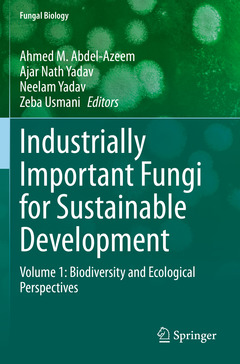Description
Industrially Important Fungi for Sustainable Development, 1st ed. 2021
Volume 1: Biodiversity and Ecological Perspectives
Fungal Biology Series
Coordinators: Abdel-Azeem Ahmed M., Yadav Ajar Nath, Yadav Neelam, Usmani Zeba
Language: English
Subjects for Industrially Important Fungi for Sustainable Development:
Industrially Important Fungi for Sustainable Development
Publication date: 06-2022
589 p. · 15.5x23.5 cm · Paperback
Publication date: 06-2022
589 p. · 15.5x23.5 cm · Paperback
Industrially Important Fungi for Sustainable Development
Publication date: 06-2021
589 p. · 15.5x23.5 cm · Hardback
Publication date: 06-2021
589 p. · 15.5x23.5 cm · Hardback
Description
/li>Contents
/li>Biography
/li>Comment
/li>
Fungi are an understudied, biotechnologically valuable group of organisms. Due to their immense range of habitats, and the consequent need to compete against a diverse array of other fungi, bacteria, and animals, fungi have developed numerous survival mechanisms. However, besides their major basic positive role in the cycling of minerals, organic matter and mobilizing insoluble nutrients, fungi have other beneficial impacts: they are considered good sources of food and active agents for a number of industrial processes involving fermentation mechanisms as in the bread, wine and beer industry. A number of fungi also produce biologically important metabolites such as enzymes, vitamins, antibiotics and several products of important pharmaceutical use; still others are involved in the production of single cell proteins. The economic value of these marked positive activities has been estimated as approximating to trillions of US dollars. The unique attributes of fungi thus herald greatpromise for their application in biotechnology and industry. Since ancient Egyptians mentioned in their medical prescriptions how they can use green molds in curing wounds as the obvious historical uses of penicillin, fungi can be grown with relative ease, making production at scale viable. The search for fungal biodiversity, and the construction of a living fungi collection, both have incredible economic potential in locating organisms with novel industrial uses that will lead to novel products. Fungi have provided the world with penicillin, lovastatin, and other globally significant medicines, and they remain an untapped resource with enormous industrial potential.
Volume 1 of Industrially Important Fungi for Sustainable Development provides an overview to understanding fungal diversity from diverse habitats and their industrial application for future sustainability. It encompasses current advanced knowledge of fungal communities and their potential biotechnological applications in industry and allied sectors. The book will be useful to scientists, researchers, and students of microbiology, biotechnology, agriculture, molecular biology, and environmental biology.
1. Biodiversity and Ecological Perspective of Industrially Important Fungi: An Introduction.- 2. Arbuscular Mycorrhizal Fungi: Biodiversity, Interaction with Plants and Potential Applications.- 3. Aspergillus from Different Habitats and Their Industrial Applications.- 4. Truffles: Biodiversity, Ecological Significances and Biotechnological applications.- 5. Biodiversity and Industrial Applications of Genus Chaetomium.- 6. Diversity of Cordyceps from Different Environmental Agroecosystems and Potential Applications.- 7. Exploring Fungal Biodiversity of Genus Epicoccum and their Biotechnological Potential.- 8. Molecular Taxonomy, Diversity and Potential Applications of Genus Fusarium.- 9. Ganoderma: Diversity, Ecological Significances and Potential Applications in Industry and Allied Sectors.- 10. Diversity, Phylogenetic Profiling of Genus Penicillium and Their Potential Applications.- 11. Piriformospora indica: Biodiversity, Ecological Significances and Biotechnological Applications for Agriculture and Allied Sectors.- 12. Saccharomyces and their Potential Applications in Food and Food Processing Industries.- 13. Biodiversity of Genus Trichoderma and their Potential Applications.- 14.Role of Fungi in Bioremediation of Soil Contaminated with Persistent Organic Compounds.- 15. Fungal Biopesticides for Agro-Environmental Sustainability.- 16. Role of Fungi in Bioremediation of Soil Contaminated with Heavy Metals.- 17. Biodiversity and Biotechnological Applications of Industrially Important Fungi: Current Research and Future Prospects.
Prof. Ahmed M. Abdel-Azeem is currently working as an academic staff member for the Botany Department, Faculty of Science, Suez Canal University, and as a mycologist with a particular interest in the ecology, taxonomy, biology, and conservation of fungi, especially on the members of the phylum Ascomycota. His research includes isolation, identification, and taxonomic assessments of these fungi with particular emphasis on those which produce bioactive materials from different ecological habitats. He is the editor in chief of Microbial Biosystems Journal (MBJ) and a reviewer of more than seven international journals. He has published more than 70 research paper journals, 27 book chapters in the books published by international publishers, and 5 books.
Dr. Neelam Yadav is currently working on microbial diversity from diverse sources and their biotechnological applications in agriculture and allied sectors. She obtained her post-graduation degree from Veer Bahadur Singh Purvanchal University, Uttar Pradesh, India. In her credit 65 publications in different reputed international, nat
Enriches understanding of fungal diversity, encompassing current advanced knowledge of fungal communities Illustrates fungal production of important metabolites for pharmaceutical use Maximizes reader insights into industrial application of fungi for future sustainability, including their potential biotechnological applications in industry and allied sectors
© 2024 LAVOISIER S.A.S.




